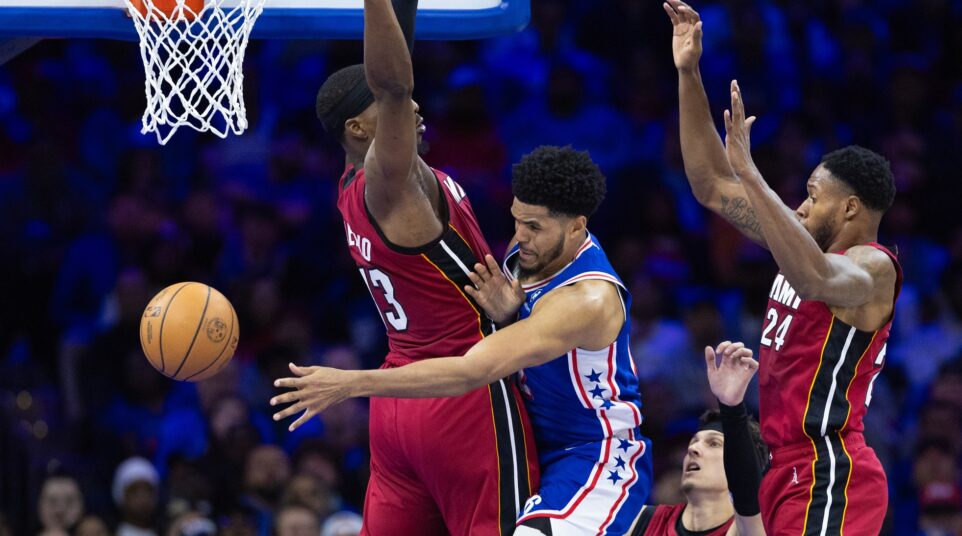
The Shaming of Shawny Hill
Last month, Crossing Broad’s own Chris wrote a story about an insensitive comment Philadelphia Wings public address announcer Shawny Hill made during a game against the Georgia Swarm. It was a blink-and-you-missed-it moment, but the damage done to Hill’s professional reputation has endured:
https://twitter.com/CFJastrzembski/status/1084488386885443584?ref_src=twsrc%5Etfw%7Ctwcamp%5Etweetembed%7Ctwterm%5E1084488386885443584%7Ctwgr%5E363937393b636f6e74726f6c&ref_url=https%3A%2F%2Fwww.crossingbroad.com%2F2019%2F01%2Fshawny-hill-said-something-bad-at-last-nights-wings-game.html
Twenty seconds into the video Chris shared on Twitter, Hill exhorts the crowd: “Let’s snip the ponytail right here.”
Hill’s throwaway remark caught the attention of Lyle Thompson, the player at whom it was directed. Thompson, a Native American who wears his hair in a way that pays homage to his ancestry, understandably took offense to Hill’s insult.
Thompson tweeted:
I know Philly takes pride in their ruthless fans but I didn’t know it was like that lol…. now I know.. just haven’t heard stuff like this since HS https://t.co/efODXZScRb
— LYLE THOMPSON (@lyle4thompson) January 13, 2019
Justice would be swift and severe, after the jump:
Shawny Hill has been "permanently removed" from his role as PA announcer by the Philadelphia Wings and has been suspended (an unknown amount of time) from all in-arena announcing assignments at the Wells Fargo Center following his insensitive comments at the Wings game Saturday.
— Anthony SanFilippo (@AntSanPhilly) January 14, 2019
It didn’t matter that Hill had apologized for his “insensitive statements,” which he asserted “do not reflect my personal beliefs, but represent a lack of knowledge on heritage and history.” The lacrosse community was not in a forgiving mood.
“You said these words, therefore they do reflect who you are!! I am so sick of people using that tired line when they get called out for saying racist things,” offered one commenter. “You would have been escorted out to your car within minutes of said comments in any barn in Canada,” alleged another. “Your words are unacceptable to Haudenosaunee people and will not be tolerated. Show us how sincere you are by resigning from your post,” demanded an outraged fan.
“The league and all of our member clubs have a zero tolerance policy for any derogatory or discriminatory statements made,” the National Lacrosse League (NLL) affirmed in its official response. For their part, in announcing the firing of Hill the Philadelphia Wings declared: “The Wings remain deeply apologetic for the offensive comments that overshadowed Saturday night’s game and are fully committed to furthering a culture of respect.”
Before continuing, let’s stipulate the following: Shawny Hill’s remarks were flippant, insensitive, and ignorant. As a public face of an organization that is trying to gain its footing in the city, Hill was walking a tightrope as he tried to energize the fans in attendance, and he fell flat on his face. His poor judgment caused a round of bad press for a franchise that is trying to re-establish itself in Philadelphia, and for a sport that is assiduously attempting to erase the increasingly false perception that lacrosse is a game for elite Main Liners.
Hill also picked a bad target. Thompson happens to be one of the best players in the league, which affords him a platform that a lesser known athlete would not enjoy. Thompson’s indigenous roots would be well known to a follower of the game, as Chris explained in his post, but might not be clear to a casual observer or, in Hill’s case, a team employee whose grasp of the sport and its native roots is not the firmest.
And there’s the rub: lacrosse is a Native American game that was adopted, or, to use less charitable terminology, appropriated by New World colonizers. Thompson’s presence in the league, along with other members of indigenous communities, helps to preserve the bridge between lacrosse’s origins and its current iteration. He can be placed in the vanguard of the fight to demonstrate that lacrosse is not just a sport for rich white kids.
The NLL and the Philadelphia Wings want their brands to be associated with diversity, and Hill’s remarks provided the perfect opportunity to showcase their cultural enlightenment. Apologies do not suffice in today’s climate. In order to demonstrate tolerance, one must be intolerant. Ostracism is the key to inclusiveness. It’s all rather Orwellian.
Yet, if I may rework a phrase commonly misattributed to Orwell, in an age of tolerance, charity is a revolutionary act. There is something about this social media era that has made us all less human. We’ve become so enmeshed in consumerism that the brand of shaving cream we use is supposed to inform our values. Our interactions are reduced to 280 characters, which often strips conversations of much-needed nuance. Sarcasm is the lingua franca, and folks spend their days on an endless quest to be outraged. Controversy is the coin of the realm, and the people with the most money are opportunists and hucksters.
It’s all so phony.
Did firing Hill engender more awareness about Native American history? Not likely. In all of the stories I read about this incident, I could only find one article that covered with any substance the reason why Hill’s comments were hurtful. In short, there was an effort at the turn of the 20th century to assimilate Native Americans. Kids were forced to attend schools that effaced their own customs and aimed to fill the void with American culture. Part of the routine involved imposing short haircuts on students.
Hill’s comments, then, unintentionally evoked this ugly chapter in our history. He could be forgiven for being unaware of this fact because our textbooks tend not to dwell on narratives that deviate from Whig history, which tends to tell the story of America as a straight, inevitable march toward progress. What does it tell you that Andrew Jackson, a genocidal madman who killed scores of Native Americans during his military career and forcibly removed all Native Americans to land west of the Mississippi River during his presidency, holds a revered place in our history?
But I would venture that the overwhelming majority of people who demanded Hill’s removal are not interested in history, or in Hill’s path to redemption. What they want is a good public shaming. It gives them an excuse to engage in the same bullying tactics they pretend to denounce.
This behavior is not productive. All it does is victimize those capable of shame while empowering the shameless.
In his excellent book on the subject, So You’ve Been Publicly Shamed, Jon Ronson writes:
“I, personally, no longer take part in the ecstatic public condemnation of people unless they’ve committed a transgression that has an actual victim, and even then not as much as I probably should. I miss the fun a little. But it feels like when I became a vegetarian. I missed the steak, although not as much as I’d anticipated, but I could no longer ignore the slaughterhouse.”
Nevertheless, I fear most of us have grown accustomed to the taste of blood. Shawny Hill was not the first person to take his place in the virtual pillory, and I doubt he will be the last.
What a shame.





